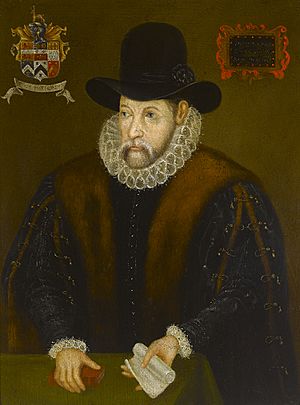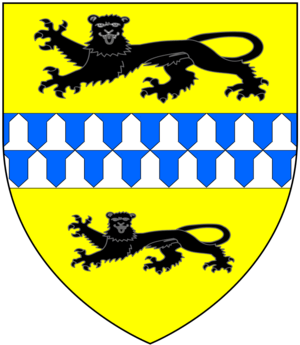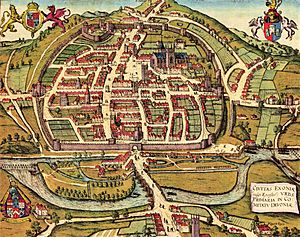John Hooker (English constitutionalist) facts for kids

John Hooker (or "Hoker") also known as John Vowell (born around 1527, died 1601) was an important person from Exeter in England. He was a historian, a writer, a solicitor (a type of lawyer), and someone who studied old things (an antiquary). He also worked as a city official. From 1555 until he died, he was the Chamberlain of Exeter, which meant he managed the city's money and affairs.
John Hooker was elected as a MP (a representative in the government) for Exeter twice, in 1570/1 and 1586. He was also an MP for Athenry in Ireland in 1569. He wrote a very important book about how Parliament should work. He also wrote about the Prayer Book Rebellion in 1549, which he saw happen in Exeter.
He spent several years in Ireland, working as a legal advisor for Sir Peter Carew. After Carew passed away in 1575, Hooker wrote his life story. He also helped edit the second edition of Raphael Holinshed's famous book, Chronicles, which came out in 1587. His last work, which was never fully finished or published, was the first detailed description of the county of Devon. He helped start a group of traders called the Merchant Adventurers with permission from Queen Mary. John Hooker was also the uncle of Richard Hooker, a very famous religious thinker.
Contents
Who Was John Hooker?
His Family Background
John Hooker was born at Bourbridge Hall in Exeter, Devon. He was the second son of Robert Vowell (who died in 1538), also known as Hooker, and his third wife, Agnes Dobell. His grandfather, John Vowell alias Hooker (who died in 1493), was also an MP for Exeter.
The Vowell family came from Wales. John Hooker's ancestor, Jago Vowell, married Alice Hooker. Because of this marriage, the Vowell family took on the name Hooker in the 1400s. This was a common practice when someone inherited property. However, they often kept their old name too, which is why John Hooker was known as John Vowell for much of his life. By the time John was born, his family was well-known in Exeter.
His Education
John Hooker received an excellent education. He studied Roman law at Oxford University. After that, he spent time in Europe, learning from important Protestant religious leaders.
Hooker's Career
Working in Exeter
During the Prayer Book Rebellion in 1549, Hooker saw the city of Exeter being attacked. He wrote a detailed account of what happened. From 1551 to 1553, he worked for Myles Coverdale, who was the Bishop of Exeter at the time. In 1555, he became the first Chamberlain of Exeter, a job he held until he died.
As Chamberlain, he was in charge of the city's money. He helped settle arguments between different trade groups and merchants. He also oversaw the rebuilding of the high school and planted many trees in the city. A very important part of his job was collecting and organizing the city's old records. He used these records to write his "Annals" of the City, which described every mayor of Exeter during the Tudor period. In 1578, he wrote and published The Lives of the Bishops of Exeter. In 1570 and 1571, he served as an MP for Exeter.
Hooker believed it was important for cities to have a long and proud history. He wrote about the idea that Exeter was founded by Corinaeus, a relative of Brutus of Britain. He also thought that Exeter's city government could be a good example for others, similar to how the Roman Republic was run.
Working in Ireland
In 1568, John Hooker went to Ireland with Sir Peter Carew to be his legal advisor. He helped Carew organize his papers to support his claim for a land area called Idrone. Hooker became so involved that in 1569, he became an MP for Athenry in the Irish parliament. Later, Hooker wrote a book about Carew's life called The dyscourse and dyscoverye of the lyffe of Sir Peter Carew.
Hooker spent a lot of time in Ireland until Carew died in 1575. However, he was also elected to the English parliament in 1571 as one of Exeter's representatives. This parliamentary session only lasted a few weeks, but he kept a detailed journal of what happened. His experiences in both the Irish and English parliaments led him to write a book about how Parliament should work. This book, called The Order and Usage how to Keepe a Parlement in England, was published in 1572. One version of the book was for William FitzWilliam, who was in charge of Ireland, to help bring order to the Irish assembly. The other version was for the Exeter city officials, to help future representatives.
In 1586, Hooker again represented Exeter in Parliament. Around this time, he was one of the editors for the second edition of Raphael Holinshed's Chronicles, which came out in 1587. Hooker's book on parliamentary practice was included in it. He also wrote an updated history of Ireland, parts of his Life of Carew, and a translation of Expugnatio Hibernica ("Conquest of Ireland"). In his writings about Ireland, he expressed his strong views on religion and politics. He believed that the native Irish people's poverty and rebelliousness were linked to their Catholic faith.
Later in Life
Hooker continued to serve Exeter in his later years. He became a coroner (an official who investigates deaths) in 1583 and a recorder (a judge) in 1590. Sir Walter Raleigh also appointed him as a steward of Bradninch in 1587. By this time, he was busy writing a historical description of his home county, Devon, which he called Synopsis Corographical of the county of Devon.
Even though Hooker revised his Synopsis many times, he probably never felt it was completely finished. Two copies of this work still exist today. These copies were used by many later writers to create their own descriptions of Devon. He also wrote about the Black Assize of Exeter in 1586, which was when a dangerous disease spread from prisoners in Exeter Prison to the courtroom and then throughout the county.
Family Life
John Hooker was married twice:
- First, in the 1540s, he married Martha Tucker. They had three sons and two daughters, including Robert Hooker (who died in 1602).
- Second, he married Anastryce Bridgeman (who lived from about 1540 to 1599). They had seven sons and five daughters.
Death
In his later years, John Hooker's health began to fail. He wrote that his "sight waxeth Dymme my hyringe [hearing] very thycke my speache imperfecte and my memory very feeble." He passed away in Exeter on November 8, 1601, at the age of 76. He was buried at St Mary Major, Exeter.
His Writings
Here are some of John Hooker's important works:
- Orders Enacted for Orphans and for their Portions within the Citie of Exeter, published in London in 1575.
- The Antique Description and Account of the City of Exeter: In Three Parts, All Written Purely by John Vowell, Alias Hoker.
- The order and usage of the keepingng of a parlement in England, published in 1572.
- A pamphlet of the offices and duties of everie particular sworned officer of the citie of Excester (sic), published in 1584.
- The Life and Times of Sir Peter Carew (who died in 1575). Hooker also put up a monument for Carew in Exeter Cathedral.
 | Chris Smalls |
 | Fred Hampton |
 | Ralph Abernathy |



